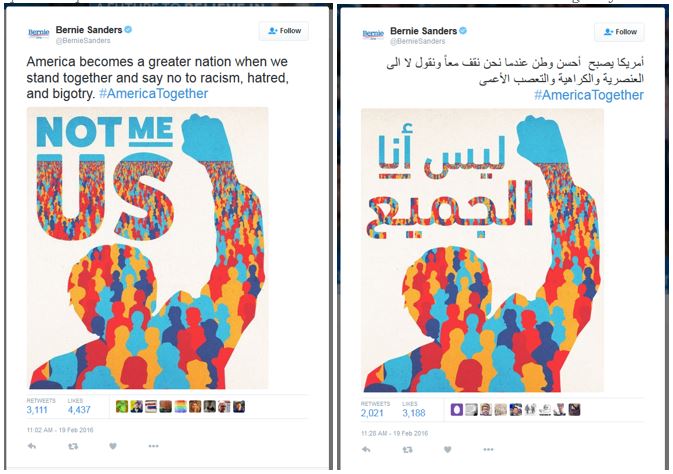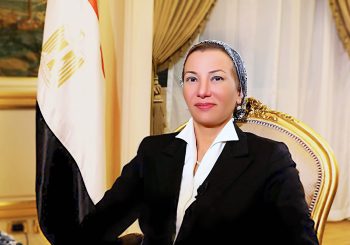
Last Friday, Bernie Sanders’ campaign forayed into Arab consciousness worldwide with a viral Arabic language post. “The rich should be taxed,” the initial message reads. Five days later, the campaign published a followup post in Arabic with the statement, “healthcare is a human right.”
This isn’t the first time the Vermont Democrat has reached out to his Arabic-speaking voters and followers. Long before Beto O’Rourke and Cory Booker’s debate tirades in tortured Spanish, Sanders understood the importance of speaking his constituency’s language. In politics, as in life, language goes beyond syntax and semantics and takes on a life of its own.
Soaking the rich and universal healthcare are hardly uniquely Arab-American issues of concern, but choosing to deliver a socialist message in Arabic is another matter entirely. It signals a new day in which speaking directly to Arab-American political aspirations in the community’s ancestral language is not an act of political suicide or worse, a terrorist battle cry. That wasn’t always the case.
Like many non-white ‘immigrant’ populations spread across generations, Arab-Americans have had to carve out their own spaces in American politics. Despite their many contributions to American life—from Ralph Nader’s pioneering consumer protection activism, all the way to Danny Thomas’ comedic genius, Arab-American loyalties have always been in question.
Contrary to common belief, the American political establishment’s apathy—or in some cases total antipathy—towards the country’s Arab, North African and Muslim electorates long predates 9/11. Anti-Arab and anti-Muslim sentiments first loomed over American politics in the late 60s and 70s amid a protracted armed conflict between Israel and its Arab neighbors and the 1973 oil embargo.
The 1980s was a rather sombre decade in Arab-American history. In a highly publicized move, former US Vice President Walter Mondale publicly turned down contributions from five Arab-American donors during his 1984 presidential campaign. The Carter Administration official later apologized and lost to Ronald Reagan. Similarly, in 1988, Democratic Presidential Nominee Michael Dukakis flat out rejected the Arab American Institute’s endorsement.
But the 1980s was also the decade Arab-American politics started to come into its own. On the other side of the political spectrum, Arabs were faring slightly better with the election of Republican Oregon Governor Victor Atiyeh in 1979, the first elected governor of Syrian descent in US history.
Arab-American activists were an instrumental and very visible component of civil rights leader Rev. Jesse Jackson’s 1984 and 1988 presidential campaigns. In the Reagan-Bush re-election campaign in 1984, Arab-Americans provided more volunteers than any other ethnic group.
Taking a page out of The Gipper’s book—“Latinos are republicans, they just don’t know it yet,” Reagan once famously said, Republican activist Grover Norquist advised George W. Bush to court the Arab-American vote in Dearborn, Michigan—home to one of the country’s largest Arab-American populations—during his 2000 presidential campaign.
In Norquist’s view, Arab-Americans were a natural GOP constituency—i.e. socially and fiscally conservative. And although Bush lost Michigan, Norquist’s gambit paid off and W. won 72 percent of the battleground state’s Arab-American votes. This electoral enthusiasm soon turned to disillusionment after the GOP’s response to the 9/11 terrorist attacks, which led to a dramatic surge in Islamophobia and anti-Arab racism that still permeate American institutions to this day.
Former US President Barack Obama is perhaps the first Democrat to fully grasp Reagan’s near prescient electoral strategy for the Republican Party. In 2014, Obama expanded his Deferred Action for Childhood Arrivals (DACA) policy when he issued an executive order to grant over 4 million unauthorized immigrants temporary protection from deportation.
In 2017, the Trump Administration rescinded Obama’s 2014 expansion and DACA may soon follow, but the Democratic Party has become home to one of the country’s fastest-growing racial groups. Similarly, by addressing Arab-American issues of concern through both policy and discourse, the Democratic Party stands to gain an important voting bloc.
According to the Arab American Institute Foundation, Americans of Arab descent are among the fastest growing Arab diaspora populations, growing by more than 72 percent between 2000 and 2010.
These demographic trends are behind the Democratic Party’s ever-expanding progressive platform, where socialist politicians like Sanders and Alexandria Ocasio-Cortez, an openly gay man like Pete Buttigieg, and a Black Muslim Hijabi like Ilhan Omar can not only run for office, but rise to the top of the upper echelons of American politics.
From Obama’s backhanded mea culpas, to the historic election of congresswomen Rashida Tlaib, Omar, and Donna Shalala, Democratic politics seem primed for an Arab-American agenda. One inextricably personal and political issue for many Arab-American voters has always been Palestinian statehood and rampant anti-Palestinian racism in the American establishment.
A decade ago, a registered sex offender (and now former US congressman) like Anthony Weiner could get away with calling Palestinians terrorists and denying that the West Bank is even occupied with little to no political cost. Today, thanks to decades of activism by Arab-American community leaders like James Zogby, Linda Sarsour and a myriad others, Palestinian rights are becoming an integral part of progressive American politics.
The Palestine question may now seem adequately addressed by democratic candidates on the debate stage, in town halls or in symbolic gestures like #SkipAIPAC or even in threats to cut aid to Israel, but it was Sanders who first challenged the treatment of Palestinians as untouchables in American politics during the 2016 presidential race.
With endorsements from leading figures in the Arab-American community, Sanders’ advocacy on behalf of Arab-Americans has yet to go beyond lip service, but if these current political and demographic trends are any indication, it doesn’t really matter because the Democratic Party has no choice but to evolve.
Racism is now more than just a morally abhorrent betrayal of mankind, it is also becoming politically inviable. With a declining white population, the GOP is now caught between the rock of political extinction and its rigid, colorless and racist base, because the future is melanated.
The opinions and ideas expressed in this article do not reflect the views of Egyptian Streets’ editorial team. To submit an opinion article, please email [email protected].






Comments (5)
[…] EGYPTIAN STREETS BY: NIVEEN GHONEIM Bernie Sanders speaking at an event in Phoenix, Arizona (photo by Gage […]
[…] Why Bernie Sanders’ Arabic Social Media Posts Matter Come June, King Tut Treasures To Be Exhibited in Boston […]